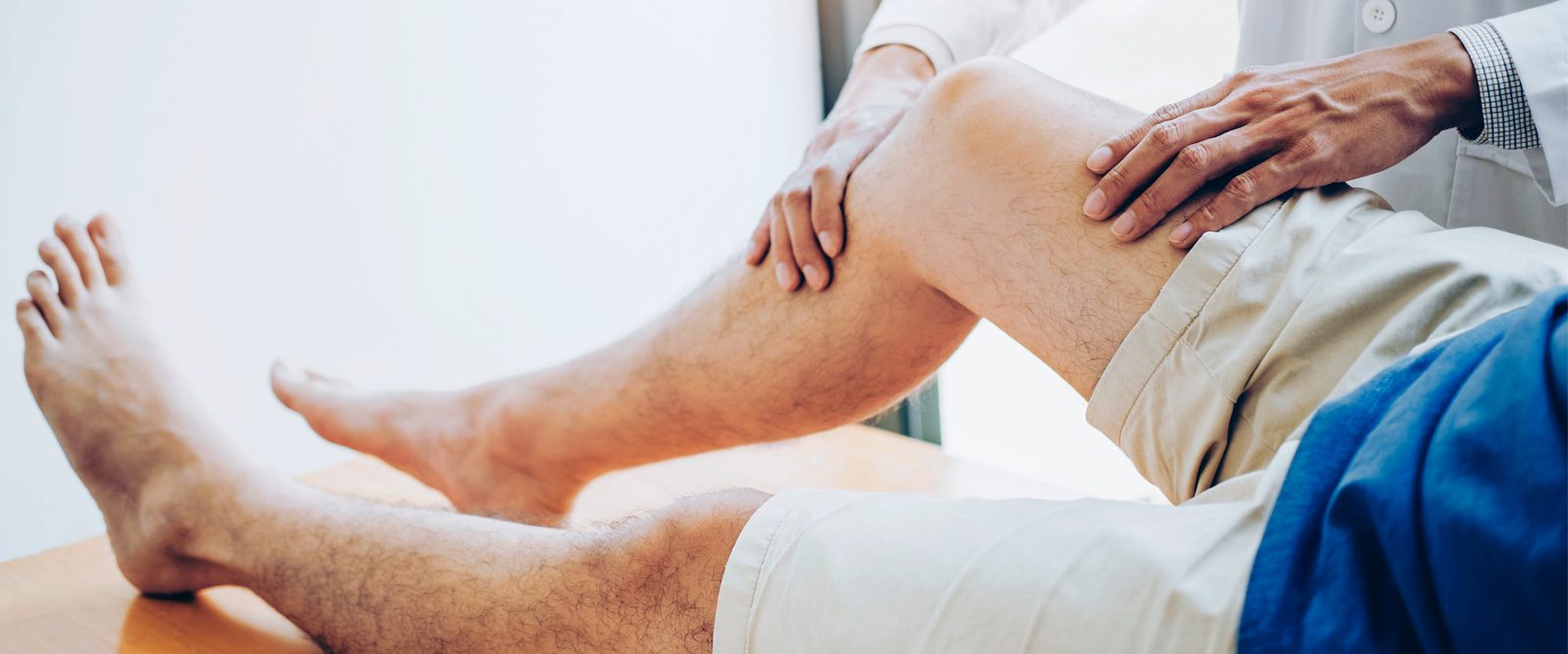What to Know About Knee Replacement Surgery
An orthopedic surgeon explains when a person should consider getting knee replacement surgery and the timeline for recovery.

As the largest joint in our body, the knee is crucial for our overall mobility — from walking and running to standing and balance. As a result, it’s also susceptible to various injuries and, as people get older, arthritis. Injuries and wear and tear can put people at greater risk for arthritis, a painful condition that limits a person’s ability to move and be active.
“The first line of treatment for anybody presenting with knee arthritis are non-operative methods of treatment, like physical therapy to work on strengthening and range of motion and function of the limb and anti-inflammatory medications,” says Dr. Carl L. Herndon, an orthopedic surgeon at NewYork-Presbyterian/Columbia University Irving Medical Center, who specializes in knee replacement. “But ultimately, the only definitive treatment for arthritis that we have in our arsenal is to remove it surgically and replace it with metal and plastic, which is a knee replacement.”
There are approximately 790,000 total knee replacements every year in the U.S., a number that is projected to grow exponentially by the year 2030.
Dr. Herndon spoke with Health Matters to better understand when someone might be a candidate for knee replacement surgery and what to expect from the procedure and recovery.

Dr. Carl Herndon
What is arthritis and how does it impact our knees?
Arthritis is the degeneration of the cartilage in a joint, and it comes in a couple of different varieties. Once you have degenerated the cartilage in the joint to a certain degree, there aren’t other great options in terms of restoring it. Especially for older patients, our treatment of choice is to replace it.
What are the signs that someone needs a knee replacement?
When someone has exhausted non-operative measures or if their symptoms have progressed to such a degree that their quality of life is so severely affected by their knee pain, then we talk about doing a knee replacement.
Typically, this is someone between the ages of 50 to 80 who has had progressive deterioration of the cartilage in the knee joint, which is what allows the bone to move easily and provides cushioning across the knee surface. This manifests as pain and stiffness, and as it progresses, can lead to the inability to do activities in daily life, like walking, playing golf, or gardening.
Are there people who are not good candidates for a total knee replacement?
People with conditions such as diabetes, obesity, kidney disease, and liver failure have increased rates of complications after surgery, so they should discuss with their doctors and see if they can modify some of their risk factors. Patients with autoimmune diseases should also discuss treatment options. We will not do a knee replacement for someone who’s a smoker.
How long are people in the hospital after knee replacement surgery?
Nowadays, for most people who don’t have any major underlying medical conditions, the surgery is done as an outpatient. So, they come to the hospital, they get their surgery, and they go home the same day.
Before they leave the hospital the patient is up and walking with a physical therapist, climbing and descending stairs, getting on and off a toilet, and getting in and out of a chair or bed. These are all things a person needs to be able to do to stay safe at home, and it shows the implant is strong and stable enough to hold their body weight.
The first couple of weeks after a knee replacement surgery can be tough. There is commonly pain, bruising, and swelling. During this time I encourage patients to not do too much with their knee. They should make sure it stays elevated, do basic range of motion exercises so the knee can get fully straight and start bending, and use ice and anti-inflammatory medications to reduce swelling. Doing too much too soon, like trying to mow the lawn with a standing mower a week after, can lead to swelling and more pain. This doesn’t mean a person shouldn’t use their knee at all. We just don’t want someone trying to run a 5K a day or two after surgery.
What is a typical timeline for recovery?
At two weeks, patients will come back to the office to be reevaluated, and by three months, an average patient should be about 90 percent recovered. Over that time they’ll start more aggressive physical therapy and rehab programs, working on more range of motion and adding strength to the muscles around the knee. It’s important to keep up with physical therapy or the person can risk getting a stiff knee, where it doesn’t bend as much as they want it to.
At three months the swelling and bruising should be gone, the pain from the surgery should be gone, motion should be back to normal and the patient shouldn’t need assistive devices, like canes or crutches. The strength component can take a little more time, just because muscles take time to add strength. That can continue all the way out to a year after surgery.
Folks who have active jobs that require a lot of standing – surgeons, waiters, bartenders, retail work – should expect to take off about six weeks. If someone has an office job that’s more sedentary, they usually go back after three to four weeks, assuming they can tolerate the commute and getting around their office. Of course, if you can work via Zoom, you could do that the same day or the day after surgery theoretically.
How long does a knee replacement last?
Barring some catastrophic issue like an infection, a knee replacement on someone between the ages of 50 to 80 will likely last them the rest of their lives. In rare instances where someone had a knee replacement in their 30s or 40s, they are going to put more miles on the new knee and may need a second replacement, but even then it’s usually swapping out a component of the implant, not another total knee replacement.
Can someone keep their knee from degrading to the point they would need a replacement?
For some people, arthritis is inevitable. They can’t reverse the process. But in general, maintaining a healthy diet, healthy body weight, and getting regular exercise are all good to protect the health of your joints. Embrace the things that help your joints will help your knees function without replacement for as long as they can.

